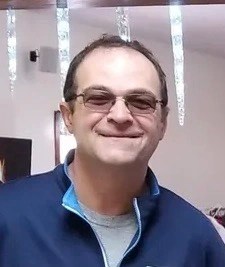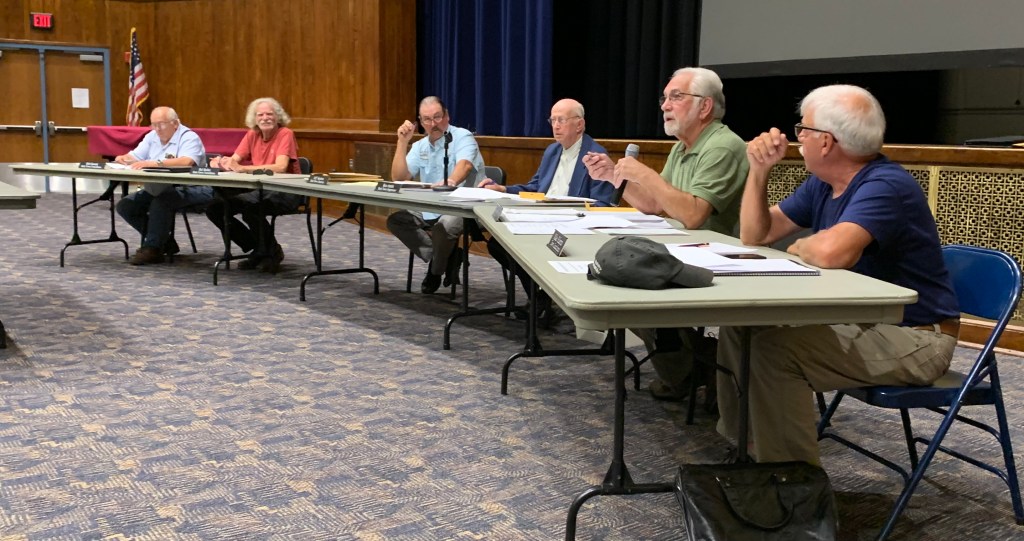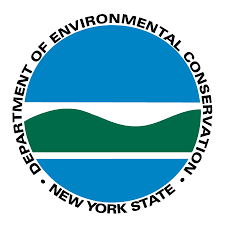THURSTON, Aug. 17, 2023 — The Thurston Town Board is preparing to enact an outright ban on the spreading of sewage sludge on fields within its jurisdiction, threatening Casella Organics’ plan to spread sludge from Long Island on 2,789 acres it recently acquired or leased.

The board voted unanimously last night to set a public hearing for Aug. 28 on a draft town law that declares:
“No sewage sludge facility shall hereafter be constructed, allowed to commence operation or to continue operation within the Town of Thurston.”
The town board plans to vote on the proposed ban on Aug. 28 at the completion of the public hearing, said Thurston Town Supervisor Michael Volino.
If enacted, such a law would appear to directly conflict with Casella Organics’ plan to begin spreading sewage sludge on Thurston fields this fall.

Last July, the subsidiary of Vermont-based Casella Waste Systems Inc. bought and leased the sludge spreading operation of Leo Dickson & Sons Inc. on Bonny Hill. The tracts include land in the towns of Thurston, Cameron and Bath in Steuben County.
The state Department of Environmental Conservation is considering applications to transfer Dickson’s sludge spreading permit to Casella Organics and to add a major new permitted source of imported sludge: the Bay Park sewage treatment plant in Nassau County.
In response, the towns of Thurston, Cameron and Bath in recent months passed identical one-year moratoriums on new or expanded solid waste projects, although the town of Bath voted earlier this week to rescind its moratorium.
Volino said the applications to transfer the sludge spreading permit to Casella Organics and to add Bay Park as a new source of sludge violate his town’s moratorium.

Casella disagrees, according to Larry Shilling, who supervises several New York landfills for Casella Waste Systems.
DEC officials appear to be leaning toward Casella’s interpretation, based on a June 23 letter from DEC Region 8 director Tim Walsh to Thurston Councilmember Holly Chase.
“Dickson’s pending modifications do not involve any physical expansion of operations or an increase in the amount of biosolids or other waste the facility can currently accept, store, or land apply,” Walsh wrote.
The Dickson sludge spreading permit allows imports from more than two dozen sewage treatment plants in the Finger Lakes, the Southern Tier and northern Pennsylvania. Bay Park produces nearly as much sludge as all of those facilities combined.
Volino argued that adding Bay Park potentially doubles the sewage spreading operation on Bonny Hill.

But Shilling said the total volume of sludge spread is limited by what the fields can absorb and won’t increase after Bay Park sludge is added. That means the smaller sewage plants in the region would need to find other ways to dispose of their sludge to make room for the new sludge from Long Island.
Asked if the proposed ban law would represent a greater threat to Casella’s sludge spreading plans than the moratorium, Shilling said:
“It is, yeah. The moratorium didn’t do anything because we aren’t expanding.”
Shilling said Casella would consult with its attorneys and with the state Department of Agriculture and Markets before taking further steps.
Thurston’s proposed ban — Local Law No. 3 of 2023 — was drafted by Rachel Treichler, the town’s pro bono attorney, and Gary Abraham, an environmental attorney based in Great Valley.
The draft law states that Thurston’s town board “finds that the health and safety of the residents of the Town of Thurston is best served by restricting the operation of sewage sludge disposal…”
The draft notes that sewage sludge frequently contains PFAS ‘forever chemicals,’ which are harmful to human health in extremely low doses. “When sewage sludge containing PFAS is spread on cropland, the plants grown on the land absorb the PFAS from the soil and groundwater, and people and animals consuming the corps absorb PFAS from the crops.”

The draft law states that PFAS chemicals bioaccumulate up the food chain. “Small amounts found in soil and water are concentrated in vegetation grown on the land or in the water, and are more concentrated in the animals that eat the vegetation, and even more concentrated in animals that eat other animals or drink their milk.”
PFAS chemicals in sewage sludge come from wastes entering the sewage treatment plants, particularly wastes from industrial facilities that produce or process PFAS and leachate from landfills that contain PFAS-laden wastes.
New York sewage plants typically are not capable of removing or destroying PFAS, so the chemicals settle in the sewage sludge.

The state of Maine last year enacted a statewide ban on the spreading of sewage sludge on fields in response to multiple cases of PFAS contamination of crops, animals and milk.
In New York, the DEC announced in May proposed standards for controlling the PFAS variants PFOA and PFOS in biosolids (its term for sewage sludge).
Those standards are vastly more relaxed that the state’s standards for the same two chemicals in public tap water.
The proposed sludge threshold for action on PFOA or PFOS is 20,000 parts per trillion — 2,000 times higher than the drinking water threshold for required remediation.

Under Gov. Kathy Hochul, the state’s proposed solid waste management plan sets a goal of recycling 85 percent of the state’s waste by 2050. To achieve that mark, the state would need to dramatically increase its recycling of sewage sludge (referred to in the plan as biosolids).
New York recycled (land spread more mixed with compost) only 22 percent of its municipal sewage sludge in 2018. To achieve the overall goal or 85 percent waste recycling statewide, the plan says, sewage sludge recycling would need to increase to 57 percent by 2050.
But Sally Rowland, an Albany-based DEC official sent to represent Gov. Hochul at a public hearing in Steuben County on Aug. 10, said the governor isn’t actually promoting an increase in sewage sludge spreading on fields.
“It doesn’t mean we’re pushing it, obligating it, in any way shape or fashion,” Rowland said. “If it happens, it happens. If it doesn’t, it doesn’t.”


Thank you for this reporting. It’s unfortunate that the DEC is derelict in its duty. And why would we want Long Island’s “biosolids” as they call them?
LikeLike
Thank you for this reporting. It’s unfortunate that the DEC is derelict in its duty. And why would we want Long Island’s “biosolids” as they call them?
LikeLike
Can’t wait for this to hit the courts as it puts the health of NYers in direct conflict with the overbearing right to farm statute. The liquid manure slurry spreading is already causing health and odor problems from the fields of factory dairy farms which defends the practice via right to farm.
LikeLike
Be sure to check out our Facebook group dedicated to this newest Casella controversy: https://www.facebook.com/groups/738218261019950
Casella’s Sneaky Sludge Invasion of Thurston, NY
LikeLike